
Frontiers of Optoelectronics
metrics 2024
Navigating the Frontiers of Light and Matter
Introduction
Frontiers of Optoelectronics is a prestigious peer-reviewed journal published by HIGHER EDUCATION PRESS, focusing on the rapidly evolving fields of electrical engineering, optical science, and material science. With its inception in 2012 and an impressive impact factor achieved by being ranked Q1 in both Electrical and Electronic Engineering and Electronic, Optical and Magnetic Materials as of 2023, this journal exemplifies excellence in research dissemination. Operating under an Open Access model since 2022, it ensures timely and widespread accessibility to cutting-edge advancements and innovative applications in optoelectronics, making it an essential resource for researchers, professionals, and students alike. The journal is indexed in Scopus, with notable ranking positions—Rank #143/797 in Electrical and Electronic Engineering and Rank #55/284 in Electronic, Optical and Magnetic Materials—highlighting its significant contribution to the academic community. Based in Beijing, China, the journal fosters a global dialogue around key technological trends, ultimately driving further development in the field.
Metrics 2024
 0.99
0.99 4.10
4.10 3.50
3.50 31
31Metrics History
Rank 2024
Scopus
IF (Web Of Science)
JCI (Web Of Science)
Quartile History
Similar Journals
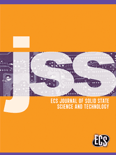
ECS Journal of Solid State Science and Technology
Fostering Global Collaboration in Materials ScienceECS Journal of Solid State Science and Technology, published by the Electrochemical Society, is a prominent journal dedicated to the advancement of research in the field of electronic, optical, and magnetic materials. With an ISSN of 2162-8769 and an E-ISSN of 2162-8777, this journal has established a significant presence since its inception in 2012, spanning critical developments in solid-state science that are essential for innovative technologies. Operating within the United States and recognized for its global outreach, it holds a respectable Q3 category ranking in the materials science category as of 2023, reflecting its commitment to high-quality research and its role in bridging theoretical and applied aspects of materials science. Researchers, professionals, and students alike will find vital information and cutting-edge studies that further the understanding and applications of solid-state technologies. The journal is accessible to an extensive audience, making it an invaluable resource for those engaged in the ever-evolving landscape of materials science.
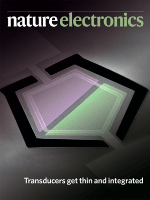
Nature Electronics
Pioneering Innovations in ElectronicsNature Electronics is a premier journal in the field of Electrical and Electronic Engineering, published by NATURE PORTFOLIO. Established in 2018 and converging until 2024, it has swiftly positioned itself as a leading platform for groundbreaking research, holding a prestigious Q1 ranking in multiple categories including Electronic, Optical and Magnetic Materials, and Instrumentation according to the latest 2023 evaluations. The journal boasts an impressive Scopus ranking, securing the top position in Instrumentation and showcasing exceptional standings in both Electrical Engineering and Materials Science. With a commitment to disseminating high-quality research, Nature Electronics offers insightful access to the latest innovations and advancements in the electronics domain, making it an essential resource for researchers, professionals, and students alike. Engaging with this journal enables readers to stay at the forefront of technological progress and fosters discussion on the future of electronic materials and devices.

Advanced Photonics Research
Fostering Collaboration, Driving DiscoveryAdvanced Photonics Research is a leading open-access journal published by WILEY, dedicated to advancing the field of photonics through rigorous research and comprehensive reviews. With its ISSN 2699-9293, the journal aims to disseminate innovative findings in areas such as photonic materials, devices, systems, and applications. Since transitioning to an Open Access model in 2020, it has significantly increased accessibility for researchers, professionals, and students alike, promoting wider dissemination and collaboration within the global photonics community. The journal's commitment to high-quality, peer-reviewed content ensures it remains an essential resource for those seeking to stay at the forefront of photonics research. Positioned to influence both academia and industry, Advanced Photonics Research is an invaluable platform for sharing cutting-edge discoveries that drive the future of technology.
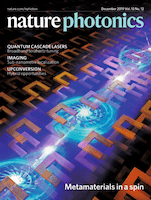
Nature Photonics
Exploring the Frontiers of Photonics InnovationNature Photonics, published by NATURE PORTFOLIO, stands as a leading journal in the realm of photonics, specializing in the convergence of atomic and molecular physics and optics, as well as electronic, optical, and magnetic materials. Established in 2007 and continuing through 2024, this esteemed journal boasts an impressive 2023 ranking of Q1 in both its primary categories, highlighting its importance and influence within the scientific community. With a Scopus rank of #3 in both materials science and physics categories, and a remarkable 99th percentile ranking, Nature Photonics serves as a vital platform for disseminating pioneering research and innovative discoveries that drive the field forward. Although it does not currently offer open access options, the journal remains accessible to a broad audience interested in the latest advancements in photonics, including researchers, professionals, and students eager to explore cutting-edge developments. By fostering a community of collaboration and knowledge exchange, Nature Photonics continually shapes the future of photonics research.

Photonics, an esteemed journal published by MDPI, is a leading platform for researchers in the fields of atomic and molecular physics, optics, and instrumentation. Since its inception in 2014, the journal has fostered open access to cutting-edge research, facilitating knowledge dissemination in these dynamic disciplines. With its Q2 ranking in the 2023 Scopus metrics for various categories, including radiology, nuclear medicine, and imaging, Photonics represents a crucial academic resource for professionals and students seeking to advance their understanding and expertise. Located in Basel, Switzerland, the journal plays a pivotal role in bridging theoretical and practical approaches to photonic technologies. Researchers are encouraged to contribute their findings, thereby enriching the journal’s impact and relevance in the global scientific community through collaboration and innovation.
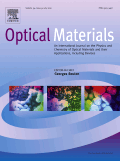
OPTICAL MATERIALS
Transforming Ideas into Optical SolutionsOPTICAL MATERIALS is a peer-reviewed journal published by Elsevier, focusing on the intricate field of optical materials within various scientific domains including atomic and molecular physics, electronic engineering, and chemistry. With an impact factor indicative of its relevance, it ranks in the Q2 category across multiple areas such as Electrical and Electronic Engineering, and Inorganic Chemistry, highlighting its critical position in advancing research and innovation. Established in 1992 and continuing its contribution until 2024, this journal serves as a vital resource for researchers and professionals aiming to disseminate significant findings in material sciences, particularly those related to optical properties and applications. While it does not offer open access, the journal remains essential for academia and industry alike, ensuring the continued exchange of valuable knowledge in this rapidly evolving field.
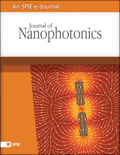
Journal of Nanophotonics
Pioneering Discoveries in NanophotonicsThe Journal of Nanophotonics, published by SPIE-SOC Photo-Optical Instrumentation Engineers, is an esteemed platform dedicated to advancing the field of nanotechnology through pioneering research in photonics. Since its inception in 2007, this journal has become instrumental in disseminating innovative findings and fostering collaborative discussions, especially in the domains of Condensed Matter Physics, Electronic, Optical and Magnetic Materials, and Nanoscience and Nanotechnology. Currently ranked within the Q3 category across these fields, it serves as a vital resource for academics, industry professionals, and students keen on exploring the multifaceted applications and implications of nanophotonic technologies. With its convergence set to continue until 2024, the journal offers a non-open-access model, ensuring rigorous peer-review standards and high-quality publications that contribute to the global body of knowledge.

JOURNAL OF ELECTRONIC MATERIALS
Connecting Researchers to Groundbreaking Insights in ElectronicsWelcome to the Journal of Electronic Materials, a premier publication in the field of materials science. Published by Springer, this esteemed journal has been a beacon for groundbreaking research in electronic, optical, and magnetic materials since its inception in 1972. As an established resource, it boasts a commendable impact factor and categorically ranks in the second quartile (Q2) in key areas such as Condensed Matter Physics and Electrical and Electronic Engineering, as well as holding a respectable third quartile ranking in fields related to Electronic, Optical, and Magnetic Materials and Materials Chemistry. Researchers, professionals, and students can access a wealth of knowledge as we publish original articles, reviews, and cutting-edge research that push the boundaries of science and technology in these critical fields. Stay informed and engaged as we explore advancements that shape the future of electronic materials.
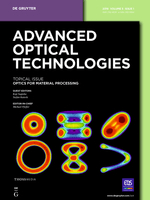
Advanced Optical Technologies
Illuminating the Future of Optical ResearchAdvanced Optical Technologies is a reputable journal dedicated to advancing the field of optics and photonics, published by FRONTIERS MEDIA SA in Switzerland. Since its inception in 2012, the journal has made significant contributions to the domains of Atomic and Molecular Physics, Electronic, Optical and Magnetic Materials, and Instrumentation, achieving commendable rankings within these categories, including a Q2 quartile classification in 2023. With an emphasis on open access, Advanced Optical Technologies aims to facilitate the rapid dissemination of research findings, thereby fostering collaboration and innovation among researchers, professionals, and students alike. The journal serves as an essential platform for cutting-edge research articles, reviews, and technical notes, and its commitment to quality is reflected in its robust Scopus rankings. As the field of optical technologies continues to expand, this journal plays a crucial role in highlighting pivotal advancements and promoting interdisciplinary dialogue among scholars in the scientific community.

OPTICA APPLICATA
Illuminating the Future of Optical ScienceOPTICA APPLICATA, published by Wroclaw University of Science and Technology, is a crucial platform for advancing knowledge in the fields of Atomic and Molecular Physics and Optics. With an ISSN of 0078-5466 and an E-ISSN of 1899-7015, this journal serves as a vital resource for researchers, professionals, and students seeking to explore the latest developments and applications in optical science and engineering. Although currently categorized in the fourth quartile in both Atomic and Molecular Physics and Electronic, Optical and Magnetic Materials, its commitment to publishing high-quality research articles, reviews, and technical notes remains unwavering. The journal covers diverse topics from practical applications to theoretical insights and fosters a collaborative environment for global contributors. While it does not offer an open access option, the journal is accessible through university libraries and institutional subscriptions. With an eye towards bridging academic research with real-world applications, OPTICA APPLICATA is well-positioned to influence advancements in photonics and materials science through ongoing issues from 1988 to 2024.